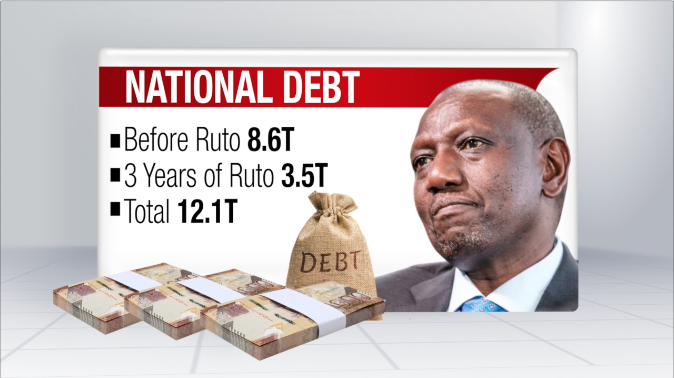
Treasury Principal Secretary Dr Chris Kiptoo. Photo/National Treasury
By Newsflash Business Writer
The National Treasury has exceeded its domestic borrowing limit by Sh220 billion, raising concerns about financial discipline and its potential impact on the private sector.
Treasury Principal Secretary (PS) Chris Kiptoo made this disclosure to the Finance and National Planning Committee of the National Assembly, admitting that the government had borrowed beyond the sanctioned amount for the current financial year.
Delayed foreign financing cited as key factor
Dr Kiptoo, speaking before the committee on March 6, attributed the excess borrowing to delays in securing foreign financing. “As of yesterday, we had borrowed Sh624 billion from the local market. This is due to delayed foreign financing,” he explained during the parliamentary session led by Molo MP Kimani Kuria. Despite this, he reassured legislators that the government still intends to remain within the Sh761 billion budget deficit approved by Parliament.
Read more: Muturi: Increase funding to strengthen Public Service Delivery
High-interest local borrowing poses risks
The breach of the borrowing cap has raised concerns about the government’s increasing reliance on domestic debt, which often carries high-interest rates and shorter repayment periods. Commercial banks are the largest lenders to the government, holding 45 percent of government securities, followed by pension funds at 32 percent.
Initially, the government planned to raise Sh263.2 billion from the local market for the 2024 financial year. However, this figure rose by Sh141.4 billion following the rejection of the Finance Bill, 2024, which had projected that the Kenya Revenue Authority (KRA) would collect an additional Sh344.3 billion to finance the Sh3.992 trillion budget.
Treasury’s commitment to debt management under scrutiny
This development contradicts the Treasury’s commitment to reducing public debt risks and costs. The 2024 Budget Policy Statement (BPS) had emphasized securing concessional loans from multilateral and bilateral partners and utilizing commercial borrowing as a last resort. “More emphasis will be placed on concessional financing, while non-concessional borrowing will only be considered for key economic projects aligned with the government’s Bottom-Up Transformation Agenda,” the BPS states.
Declining revenue, rising expenditure
Kenya’s revenue as a percentage of Gross Domestic Product (GDP) has been steadily declining, dropping from 18.1 percent in the 2013/2014 financial year to 14.3 percent in 2022/2023. Meanwhile, government expenditure continues to rise, increasing dependency on borrowing to cover budget deficits.
National Assembly Committee raises alarm
The National Assembly’s Budget and Appropriations Committee has repeatedly warned against excessive domestic borrowing. The committee’s report on the first supplementary budget for the current fiscal year highlighted rising interest rates on Treasury bills, with yields on 91-day and 182-day Treasury bills increasing from 9.76 percent to 16.68 percent and from 10.06 percent to 16.86 percent, respectively.
Also read: Cane farmers demand probe into Mumias Sugar manager over tax debt
Lawmakers cautioned that continued borrowing at such rates could discourage private-sector lending, stifle investment, and hinder job creation. “The committee noted that this may pose a risk of crowding out cheap credit to the private sector, as lenders may prefer lending to the government rather than businesses,” the report stated.
During the committee meeting, Baringo North MP Joseph Makilap criticized the Treasury for its lack of fiscal discipline. “There is too much balancing at the National Treasury due to over-optimistic revenue projections. We are now borrowing simply to repay debts,” he stated.



